| This article is part of a series on the |
| Politics of Colombia |
|---|
 |
Parliamentary elections were held in Colombia on 18 March 1962 to elect the Senate and Chamber of Representatives. [1] Under the National Front agreement, only the Conservative Party and the Liberal Party were allowed to contest the elections, with each party allocated 50% of the seats in both houses. [2] As a result, the main contest at the elections was between factions within each party. [2]